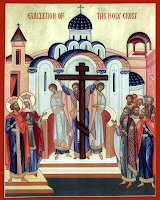 Today the Church celebrates The Exaltation of the Cross. This feast was observed in Rome before the end of the seventh century.
It commemorates the recovery of the Holy Cross, which had been placed on
Mt. Calvary by St. Helena and preserved in Jerusalem, but then had
fallen into the hands of Chosroas, King of the Persians. The precious
relic was recovered and returned to Jerusalem by Emperor Heralius in
629.
Today the Church celebrates The Exaltation of the Cross. This feast was observed in Rome before the end of the seventh century.
It commemorates the recovery of the Holy Cross, which had been placed on
Mt. Calvary by St. Helena and preserved in Jerusalem, but then had
fallen into the hands of Chosroas, King of the Persians. The precious
relic was recovered and returned to Jerusalem by Emperor Heralius in
629.In the Scripture readings for today's Mass, we hear about about how the people were healed when they looked upon the brass serpent lifted up on a pole by Moses. In the same way (as we hear in the Gospel Reading) we should look the Christ's sacrifice on the Cross to heal of our sins, to place our trust in him, and imitate him in all things. Our Lord said elsewhere "Whoever does not take up his cross and follow after me is not worthy of me." (Matthew 10:38)
Archbishop Fulton J. Sheen, who was recently declared Venerable, used to say that any doctrine that rejected suffering and the Cross was of the Devil and should be rejected. He also remarked that without the Cross in our life, there would be no empty tomb. St. John of the Cross wrote "A person makes progress only by imitating Christ, who is the Way, the Truth and the Life. I would not consider any spirituality worthwhile that wants talk of sweetness and ease and that that runs from the imitation of Christ."
The Cross is all around us. Yes, it tops our church steeples; we might wear one around our necks or hang one on our wall; we bless ourselves with the sign of it before and after prayer. The Cross is an ever-present reminder to us that while God's grace is free, it is never cheap. The modern gospels of "health and wealth, "name it and claim it" or "blab it and grab it" fall short. Our modern hedonistic and self-absorbed culture that allows one to follow a non-challenging religion of our own making is a trap and a lie.
Thomas a Kempis, in Chapter 36 of Book 2 of the classic devotional work Imitation of Christ "On the Few Lovers of the Cross of Christ" says this.
Jesus has many who love His Kingdom in Heaven, but few who bear His Cross (Luke 14:27). He has many who desire comfort, but few who desire suffering. He finds many to share His feast, but few His fasting. All desire to rejoice with Him, but few are willing to suffer for His sake. Many follow Jesus to the Breaking of Bread, but few to the drinking of the Cup of His Passion. Many admire His miracles, but few follow Him in the humiliation of His Cross. Many love Jesus as long as no hardship touches them. Many praise and bless Him, as long as they are receiving any comfort from Him. But if Jesus withdraw Himself, they fall to complaining and utter dejection.
They who love Jesus for His own sake, and not for the sake of comfort for themselves, bless Him in every trial and anguish of heart, no less than in the greatest joy. And were He never willing to bestow comfort on them, they would still always praise Him and give Him thanks.
Oh, how powerful is the pure love of Jesus, free from all self-interest and self-love! Are they not all mercenaries, who are always seeking comfort? Do they not betray themselves as lovers of self rather than of Christ, when they are always thinking of their own advantage and gain? Where will you find one who is willing to serve God without reward?
Seldom is anyone so spiritual as to strip himself entirely of self-love. Who can point out anyone who is truly poor in spirit and entirely detached from creatures? His rare worth exceeds all on earth. If a man gave away all that he possessed, yet it is nothing. And if he did hard penance, still it is little. And if he attained all knowledge, he is still far from his goal. And if he had great virtue and most ardent devotion, he still lacks much, and especially the `one thing needful to him' (Luke 10:42). And what is this? That he forsakes himself and all else, and completely denies himself, retaining no trace of self-love. And when he has done all that he ought to do, let him feel that he has done nothing.
Let him not regard as great what others might esteem great, but let him truthfully confess himself an unprofitable servant. For these are the words of the Truth Himself: `When you shall have done all those things that are commanded you, say, "We are unprofitable servants" (Luke 17:10). Then he may indeed be called poor and naked in spirit, and say with the Prophet, `I am alone and poor' (Ps. 25:16). Yet there is no man richer, more powerful or freer than he who can forsake himself and all else, and set himself in the lowest place.











